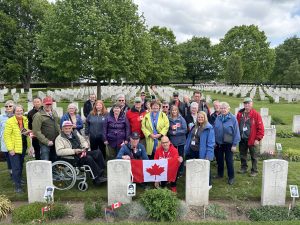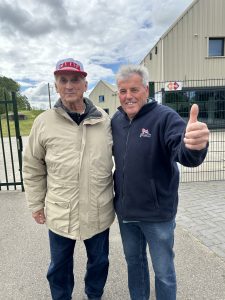
Most of you don’t know the name of the source for my story this week. But all of you know him. If you know someone who spends most of his time on the land, you know him. If that person is also self-made, a bit of a loner, not always outspoken, but remarkably prescient of people and trends, then you know him.
The first time I had a conversation with John Imanse, we were standing outside a tour bus near Amsterdam in 2005. Off to the side, he puffed on his cigarette like there was no tomorrow. Imanse, then 59, was one of over 100 people I was hosting on a tour around the Netherlands celebrating the 60th anniversary of Dutch liberation.
“What made you want to come on this tour? I asked him.
He motioned to the bus driver and said, “So I wouldn’t have to do that!” I wasn’t sure what he meant. “I’m a farmer,” he said. “I’ve always got my hands on the wheel of a tractor. But for the 10 days of this tour, I don’t even have to think about driving.” A big smile took over his face and he laughed with a throaty chuckle.
I would hear that distinctive laugh many times over the next 20 years. Nearly every spring or summer after that (except the pandemic years), Imanse would take that busman’s holiday, joining my battlefield tours away from his farm near Varna, Ont., where he’d grown cash crops and raised chickens all his working life.
The next year, we visited wartime sites in England. In 2007, he joined our tour to France for the 95th anniversary of the battle of Vimy Ridge. In 2008, he left his farm tractor behind for our battlefield tour to Sicily and Italy. In 2009, he came to Normandy for the 75th anniversary of D-Day.
And even though he’d travelled with us to the Netherlands in 2005, in 2010 he rejoined us for a repeat tour of Dutch liberation battlefields and memorials.

On that visit, he and I stood in Holten War Cemetery (1,394 Canadians are buried there) at the grave of Private John Boltz, 25, killed in the Netherlands in April 1945.
“I don’t know why I come to these sad places,” Imanse said to me out loud. “Maybe it’s the last time any of us will ever visit his grave and we’re doing his family a favour.”
Only then, during our second trip to the Netherlands, did I discover that John Imanse, our perennial battlefield tourist, had a strong connection to the wartime Nazi occupation of his birthplace.
Born right after the war in Holland, John had eight brothers and sisters and two half siblings – “eight wholes and two halves,” he called them – on a small farm at Lisse, near Amsterdam. As such, the Imanse home was regularly pillaged by Nazi razzias; even in that hunger winter of 1945, however, his parents managed to feed a dozen mouths and hide others on the run.
When several of the “eight wholes and two halves” joined John for our third trip to the Netherlands in 2015, his brother Andrew Imanse said he remembered German troops marching everywhere. “You could hear them from miles away.”
Unlike John, whose branch of the family immigrated to the farm in western Ontario, Andrew Imanse instead settled in California, eventually heading a manufacturing firm building 6,500 buses a year. When the brothers compared their postwar careers, Andrew noted having to keep 1,200 employees happy, “while John has no employee problems at all, since all his employees are chickens.”

Earlier this month, John Imanse joined us for yet a fourth tour of the Netherlands. At 78 and enjoying semi-retirement, he was leaving his “employees,” the thousands of chickens in the care of his nephew.
But in addition to leaving the livestock and tractor behind this trip, we learned that our veteran of over 20 tours had recently kicked the smoking habit. On the tour, people enjoyed his wry sense of humour, his unique laughter and his deep reverence for Canadians who helped liberate his family in 1945.
“I grew up in Canada with veterans all around me,” John Imanse told me in 2010, “hearing their stories about liberating us.”
Just days after we returned from this most recent trip overseas, farmer Imanse wrapped his hands around the wheel of his tractor yet again for the spring planting. Suddenly, he fell ill and died as quickly in hospital. We’re all devastated.
As his comrade traveller, I treat the passing of John Imanse like that of the many veterans who enriched our battlefield tours over two decades. We will remember him.